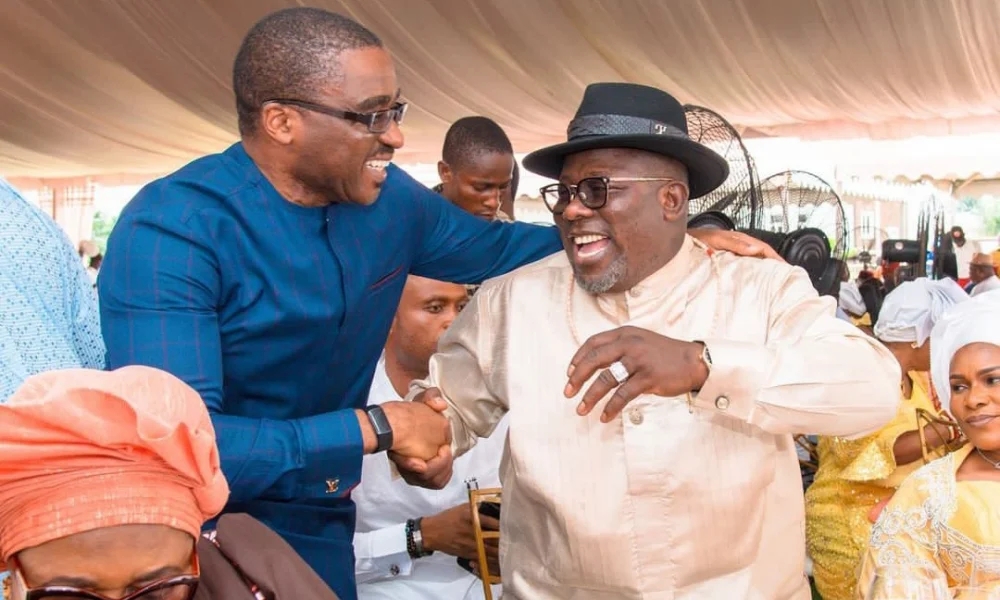Delta’s Peoples Democratic Party PDP, Governoship candidate, Rt. Hon. Sheriff Oborevwori, has appealed the ruling of the Federal High Court, Abuja, presided over by Justice Taiwo Taiwo, which disqualified him as the winner of the Primaries, on the grounds of discrepancies in the documents he presented to the Independent National Electoral Commission.
It’s important to also clarify that while the Abuja Federal High Court only upheld the case of the petitioner seeking the disqualification of the defendant, it however, declined to make further pronouncement on the matter, as requested by the petitioners in their prayers.
Here is exactly what the Abuja Federal High Court, presided over by Justice Taiwo Taiwo, ruled on Thursday, July 7, 2022:

1. The judge, JusticeTaiwo Taiwo, having cited the allegations of certificate falsification and forgery levelled against Rt. Hon. Sheriff Oborevwori, in a suit filed by his closest rival, Mr. David Edevbie, in the contest for the PDP 2023 Governorship ticket, upheld Mr Edevbie’s case but did not however categorically pronounce David Edevbie or anybody else as Mr Oborevwori’s replacement, as claimed in multiple media reports.
2. The Judge, Justice Taiwo Taiwo, equally ruled that it was premature to declare anybody as the party’s candidate when INEC had yet to officially published the name of the party’s governorship candidate.
3. The Judge did not also order a fresh primary election.
RT. HON. OBOREVWORI’S GROUNDS FOR APPEAL
Rt. Hon. Sheriff Oborevwori has appealed the ruling of the Federal High Court and also sought for a stay of execution of the verdict delivered on Thursday, July 7, by Justice Taiwo Taiwo, the presiding Judge of the Federal High Court sitting in Abuja.
Rt. Hon. Oborevwori, who is also the incumbent Speaker of the Delta State House of Assembly, sought an order granting his appeal and setting aside the lower court’s judgement disqualifying him as the Delta PDP governorship candidate of the Peoples Democratic Party (PDP) in the forthcoming 2023 elections, on the following Nine grounds of Appeal:
1. Sheriff Oborevwori, through his lawyer, Joe Agi, SAN, said the trial judge, misdirected himself by wrongly assuming jurisdiction to hear Mr Edevbie’s suit.
2. He argued that no cause of action had arisen to give the plaintiff the right to sue over the candidacy of the party, when INEC had yet to publish the name of the party’s candidate. “The 1st respondent (Edevbie) admitted on oath, that the name of the appellant was yet to be submitted but the trial court held that the 1st respondent by law need not wait for the publication of the name of the appellant by the Independent National Electoral Commission before approaching the court,” the notice of appeal reads in part.
3. The appellant (Sheriff Oborevwori) argued that unless the political party sponsoring a candidate submits the name and INEC publishes the name, accompanied by a High Court affidavit indicating that he or she has fulfilled all the constitutional requirements for the election, “that is the only time the court can be approached not before”.
4. The appealant (Sheriff Oborevwori), also argued in another grounds of appeal, that the trial judge erroneously agreed with Mr Edevbie that he failed to meet the constitutional requirement of sections 177(a) and 182(1)(j) of the Nigerian constitution because of his use of forged certificates.
5. Rt. Hon. Oborevwori, who denied submitting forged certificates to INEC, contended that the requirement of sections 177(a) and 182(1)(j) of the Nigerian constitution, could only come into play “upon presentation of a forged certificate to INEC and no other body or person, which is not the case before the court.”
6. Joe Agi, SAN, lead Counsel to Rt. Hon. Oborevwori, also said the court “makes mockery of the law” by relying on the documents he submitted to INEC in 2018 for his election to the Delta State House of Assembly of Delta State or to the PDP on April 30, 2022, which was “way after 14 days of the filing of the suit” contrary to section 285(14) of the Nigerian constitution.
7. The appellant (Oborevwori), also argued that the Judge erred in law, by holding that he did not challenge the claims that his certificate was forged. He said the burden of proof “is on the plaintiff and not on the weakness of the case of the defendant.”
8. The appellant equally argued that the case before the court was an intra-party affair of the PDP which he averred that the court had no jurisdiction to entertain. He also faulted the court’s decision for holding that the plaintiff “has proved his case and therefore entitled to judgement”.
9. The appealant also contended that the trial judge erred in law by glossing over his explanation of the discrepancies in his name, backed by a government gazette in a reply he filed on June 17, 2022.
PRAYER
He then sought an order granting his appeal and setting aside the lower court’s judgement.
STAY OF EXECUTION
In a separate application filed at the Federal High Court, the appellant sought an order of stay of execution. He said the judgement, if not stayed, would render the appeal an academic exercise.
Story originally reported by PREMIUM TIMES, July 8, 2022




GIPHY App Key not set. Please check settings